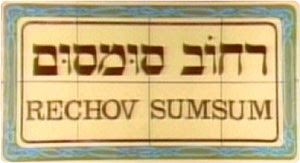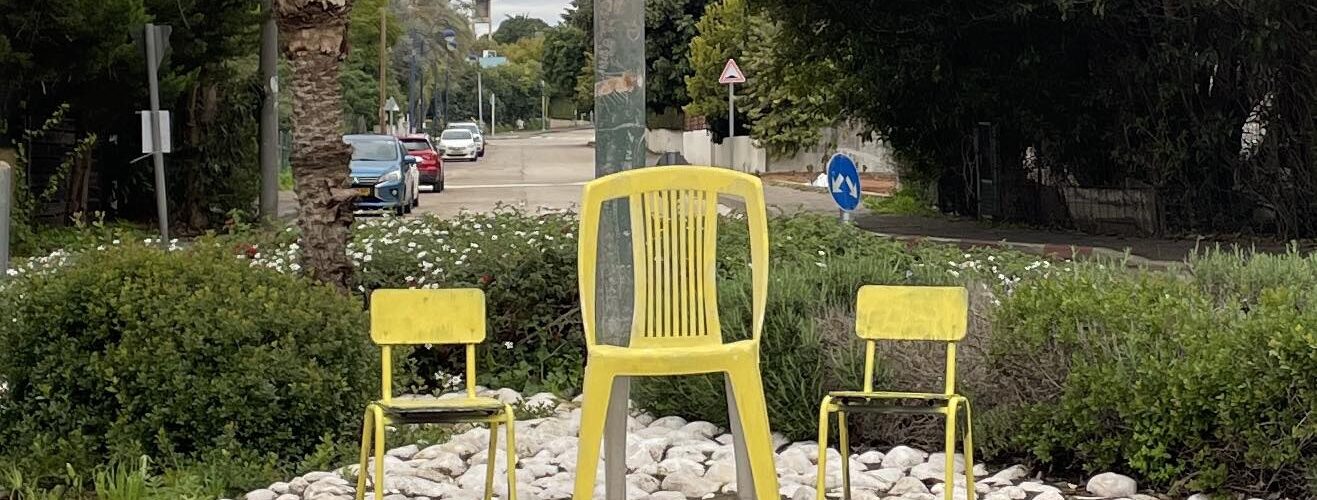Fortunately for me, my early childhood took place before big purple dinosaurs roamed the earth. My brother and I grew up on a diet of Mr. Rogers, the Electric Company, and Captain Kangaroo, among others. The unquestionable king of this genre was, of course, Sesame Street, where we learned our numbers in English and Spanish, we became intimately acquainted with the alphabet (“the sponsor of today’s show is the letter ‘L…'”), and discovered that people from different races, large birds, invisible elephants, and happily unkempt inhabitants of garbage cans could come together in harmonious diversity, teaching children that our differences should be embraced and celebrated. To this day, I have fond memories of Sesame Street, and admit that I felt a flutter in my heart upon seeing the Sesame Street display at the New York State Museum during our visit to the US last summer, containing sections of the original set, as well as explanations about the show’s various rites of passage.
I tried to get the Little One interested in the current American version of Sesame Street when we were in the US, but he greatly preferred the numerous other shows being broadcast on PBS Kids and the Disney Channel. We do, however, have a few Sesame Street videos that we brought back with us, and he enjoys watching Baby Bear learn the alphabet (which includes the classic song shown below) and Ernie teaching the others how to count. It’s not quite the same, though, and he’d much rather focus his attention elsewhere.
[youtube=http://www.youtube.com/watch?v=SKYMpRSvg2Y]Therefore, you can imagine my joy at discovering that the Israeli version of this classic is now being broadcast on our local children’s channel, not to mention my delight in seeing my son fall in love with this current local version just as I did more than thirty years ago. Rehov Sumsum (pronounced “soom-soom”), has captured my heart just as much as it has captured the heart of the Little One, and we snuggle together on the couch as we watch the antics of Arik and Bentz (the Hebraicized names given to Ernie and Bert) taken from the original American show, as well as the characters created especially for the Israeli version. They have continued with the tradition of diversity by including characters who are native-born Jews, native-born Arabs, and immigrants. Our favorite character is a trendy little muppet of Arab descent named Mahboob, who speaks mostly in Hebrew, but counts in Arabic and often teaches the others about different aspects of his culture.
 I want my son to love his country and to be proud of his identity, and I also want him to understand and embrace the concept of diversity. I want him to realize that exposure to different cultures provides an opportunity to learn, whether it be the exotic cultures of distant lands or different cultures existing in Israel and the US. I want him to know that he has neighbors whose holidays are different from his own, and whose cultures are just as rich and beautiful as the one in which he is being brought up. Most of all, I want him to accept these people and their differences, and to know that different does not mean bad. And if it is spiky-haired, bespectacled Mahboob who teaches him such things, then so much the better. I know that life is not Sesame Street and Sesame Street is not real, but the lessons it offers my son are the lessons he will carry with him for a lifetime, just as the original Sesame Street did for his mother.
I want my son to love his country and to be proud of his identity, and I also want him to understand and embrace the concept of diversity. I want him to realize that exposure to different cultures provides an opportunity to learn, whether it be the exotic cultures of distant lands or different cultures existing in Israel and the US. I want him to know that he has neighbors whose holidays are different from his own, and whose cultures are just as rich and beautiful as the one in which he is being brought up. Most of all, I want him to accept these people and their differences, and to know that different does not mean bad. And if it is spiky-haired, bespectacled Mahboob who teaches him such things, then so much the better. I know that life is not Sesame Street and Sesame Street is not real, but the lessons it offers my son are the lessons he will carry with him for a lifetime, just as the original Sesame Street did for his mother.

I have some “Shalom Sesame” tapes, which meld the English and Hebrew versions, my kids love it. I seriously need to buy some Dora DVD’s while there though.
I think even more than Sesame Street, we need an Israeli Mr. Rogers.
That should quiet kids down…(and keep them calm)
An Israeli Mr. Rogers would be awesome. Maybe he’d quiet the adults down too. That’s what we really need! Beautiful days in the neighborhood would be a nice chance also…
Lisoosh, I’ll keep an eye out for the Dora DVDs.
Where would we be without Mehboob?
And hello from Marrakesh.
Never really got into Sesame Street but I love your attitude to parenting.
I learned Hebrew from watching Rehov Sumsum when visiting my cousins every summer. I don’t think Mahboob was around 20 years ago, but I do remember a very large purple hedgehog…
Lisoosh- Israeli Dora is just about bearable, but she speaks *terrible* English! (I can write about her for hours, but I won’t)
My Marrakesh: Welcome to something something! So true about Mahboob. Gotta love him!
BTW, You have a fabulous blog! The photos are amazing!
Life out east: Somehow I had a feeling that Sesame Street wouldn’t be your cup of tea. Was it at all popular in England? Thanks for the compliments! I’ve always been fascinated by other cultures, always seeking out foreign students to befriend in school, was active in international clubs in high school and university, etc. While Israel is very diverse on some levels, the way that diversity plays out here is different from what I grew up with. I want him to have friends from all over the place, just as I do, and to be sensitive to other people, no matter who they are or where they’re from. I don’t know how to explain it, really. I want him to be different from the youth that I see today. I want him to be more aware of his surroundings.
Tafka: We used to watch Rehov Sumsum when I was in ulpan about a million years ago. Mahboob wasn’t around then, but Kipi Kipod was all the rage, as I recall. We even called those plaid zip-up slippers “Kipi slippers”.
Too right about Hebrew Dora. Her English sucks, and I often sit there cringing when she and the others mispronounce words.
That’s excellent! Ireland has not embraced Sesame Street yet, but I have high hopes for the future. 😉
My kids became hooked on Sesame Street during visits to the US and from tapes sent by friends. They thought it was neat that some of the segments were on when I was a kid! We haven’t watched the tapes in a very long time, but they do like Rehov Sumsum- and Dora (it bothers me too the way she’s not a native English speaker. How hard would it have been to hire one?)
I always LOVED the “J” song! And I don’t think you can legally refer to Snuffy as an elephant- he’s that word I can’t spell. You know he became visible to the whole neighborhood several years back, don’t you?
Yep, we had Sesame Street when I was a kid but I just never really got it I guess. I grew up in the country and spent more time outside than watching tv.
I feel the same about the duaghter. I want her to know where she comes from and be proud of her heritage but at the same time be aware of and open to all over cultures. At three and a half she’s travelled quite a bit and probably knows more about geography than most her age. She’s also gained from being at a multi-national school with friends from all over the world.
This is another reason why I don’t want her to be too Thai – Thais tend to be very inward looking and basically their culture and society teach what can only be described as racism.
Has the stalker stopped yet or are you still deleting posts?
JJ Jean and the jelly bean, hey, let’s sing a song about J!!
Yep, big fan!!!
They have Sesam Stasjon here in Norway, but it’s just not the same. I have videos, though. And my eldest viking girl loves the count, just as her mom did!!
Am back from New Zealand, by the way. Coughed and hacked my way through it and am still sick upon return… but it was still a fantabulous trip! Can recommend to one and all!!
Mehboob is a great name! 🙂
Of course, different not always means bad. But sometimes it does. The very idea of progress incompatible with ascribing equal value to all cultures: obviously, some are more advanced and rich than others. And some are manifestly evil. To what levels of barbarity or savagery are you ready to fraternize: paganizm, idolatry, cannibalizm, Nazism? They all are “cultures” of some kind.
@ Sergey,
Yes, some cultures are ones with whom fraternization would not be a positive experience. But knowledge of them is still necessary to be able to have an educated opion, yes? And becoming informed is a far cry from being in agreement or fraternizing, wouldn’t you agree?
On the other hand, I fail to see the danger of Mehboob and the Shalom Sesame gang…
And my theory that I am putting into practice in my own family is that exposure to as many different cultures as possible is incredibly positive. It will give my children appreciation for what is different, and appreciation for what is familiar. As well as the opportunity to mix and match and find what is right for them. I’ll be throwing in my 2 cents along the way, but ultimately it will be their decision–what to believe in, what culture to embrace, what religion (if any) to believe in. But the more info they can base those decisions on, the better.
AM, I agree, it is always helpful to know your enemy, especially when existential struggle is looming. What I do not agree is the spirit of moral relativism, inherent to every multiculturalism advocacy. And I also expect that when today kids will approach their adulthood this multiculturalism will be dead in water, and many sacred leftist beliefs will be laughing-stock to them. They will not be grateful to us for this disarming indoctrination, quite contrary.